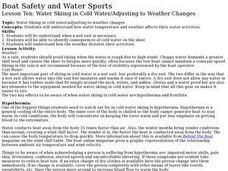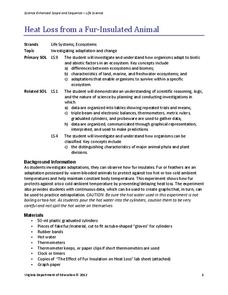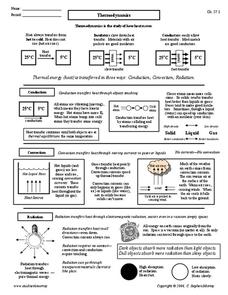Curated OER
Make Your Own Temperature Scale
Differentiate between temperature and thermal energy. Your class will build a thermometer using simple materials and develop their own scale for measuring temperature. Discuss with your class and consider why engineers need to understand...
Texas State Energy Conservation Office
Investigation: Insulation
Youngsters compare the heat-holding abilities of three different cans by insulating two with different materials and measuring the temperature change of hot water over a 20-minute period.
American Chemical Society
Temperature and the Rate of a Chemical Reaction
Putting glow sticks in the freezer makes them last longer, but why is that? Lesson focuses on how temperature impacts the rate of a chemical reaction. It begins with a teacher demonstration, then scholars design their own experiments...
Institute of Electrical and Electronics Engineers
Keep it Cool
This cool lesson plan is ideal for elementary engineers or physical scientists, especially when learning about heat transfer and insulation. After reading a page of background information, engineering teams collaborate to design and...
Curated OER
Boat Safety and Water Sports - Lesson 10 - Cold Water/Weather
Lesson 10 is part of a twenty-two lesson unit on boat safety and water sports. It focuses on how to handle cold water and cold weather when water skiing, as well as what to do if hypothermia or frostbite occur. Click on the resource...
Virginia Department of Education
Heat Loss from a Fur-Insulated Animal
How do animals adapt to weather changes? Provide your class with the ability to understand adaptations and body temperature as they participate in this hands on experiment, using fake fur and hot water. Pupils collect data and...
Curated OER
Winter Insulation
Students test insulation materials. In this energy conservation lesson, students use different insulation materials to see which one holds heat the best. Students pour hot water into bottles, take the temperature, wait 15 minutes, then...
Curated OER
What is the Best Insulator: Air, Styrofoam, Foil, or Cotton?
Students investigate the properties of insulators by attempting to keep a cup of water from freezing, and once it is frozen, to keep it from melting. They conduct the experiment, record and analyze the results, and answer discussion...
Polar Trec
Sea Ice Impact
The arctic seas contain currents that are both warm (with high salinity) and cold (relatively fresh water) that circulate throughout the year. Through discussion, a lab, and a web quest, participants explore the impacts of melting and...
Curated OER
Hypothermia: Temperature Changes Under Varying Conditions
Students conduct an experiment to determine what type of clothing would be most suitable for outdoor activities. They determine the temperature changes of the skin under various wet clothing materials and graph the temperature changes. ...
Curated OER
Animal Science - Body Temperature
Students use the TI-83 + linked to the CBL2 and temperature probes to perform an experiment. Each of the temperature probes is placed into a different cup, one insulated and one not insulated. Each cup holds warm water. The two cups are...
Curated OER
Solar Water Heater Kit
In this earth science worksheet, learners identify and experiment how hot water gets in a solar water heater. Then they respond to four short answer questions that follow related to the experiment.
Curated OER
Keeping Warm
There are five separate lessons about heat in this collection of slides. Young scientists learn how to use a thermometer to measure temperature, and they experiment with insulators. You can use one of these lessons each day for a full...
Curated OER
Heat Energy - Energy Transfer
Here's a great selection of slides for a class being introduced to heat transfer. Types of materials that are good conductors or insulators are covered and the diagrams that accompany the information should make understanding more...
Curated OER
Changes in Heat
A thorough PowerPoint provides information related to changes in heat. The contrast between day and night temperatures is included. The concepts of boiling and freezing are also covered. Insulators and conductors are presented as well.
Curated OER
2005 Grade 8 Science Released Test Questions
Here is a collection of 22 multiple-choice questions on topics from the physical and life sciences. Apparently they came from an 8th grade comprehensive science exam and have been released for public use. They may serve as a sufficient...
Cornell University
Energy Changes in Chemical Reactions
The heat of solution measures how much thermal energy a dissolving substance consumes or gives off. The experiment demonstrates both endothermic and exothermic reactions. Scholars dissolve several substances, measure the temperature...
Curated OER
Keeping Warm
Students experiment with thermal insulators. In this heat transfer lesson, students predict and then measure heat loss from a cup of water using different materials as insulators. Students complete a line graph to display their results.
Rice University
What Should You Wear In Antarctica?
Students weigh various battings and feathers. They make sure to have the same weight of each type of insulations. Students wrap one bottle of warm water in each of the two insulations. They measure the temperature of each bottle,...
Curated OER
Thermodynamics
In this thermodynamics instructional activity, students learn about insulators and conductors. Students compare the three ways thermal energy is transferred: conduction, convection, and radiation. This instructional activity has 22...
Curated OER
Animal Adaptations to the Cold
Student's explore the concept of animal adaptations. In this animal science lesson, students create insulated mittens and conduct an investigation with cold water. Students discuss the results and make connections to animals...
Curated OER
Measuring Solar Energy
Students study solar energy and how to measure it. In this energy sources lesson students complete a lab, obtain data and use that to convert surface temperature to energy.
Curated OER
Keeping Warm When it is Cold: How does a polar bear keep warm?
Young scholars make a model of a polar bear and discuss why fur/skin color is important. They also perform a simple experiment using black and white socks to determine how color affects temperature.
Curated OER
Computer Science: Temperature
Students conduct an experiment on heat transfer and how it works. They record the temperature in whatever environment is surrounding the container and run experiments that use at least two different ambient temperatures. Students...

























